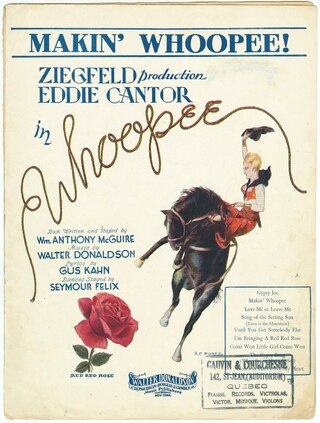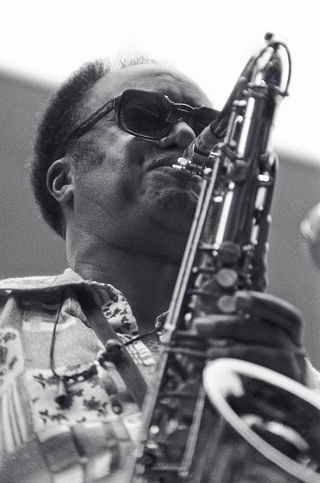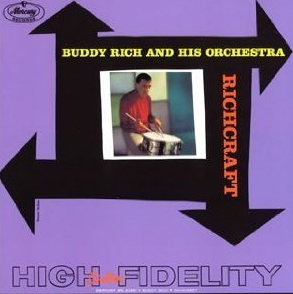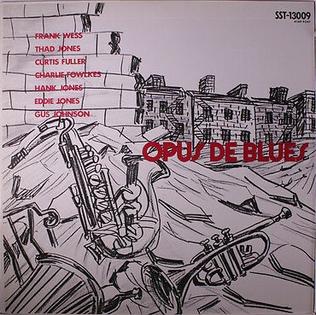
Alexander Emil Caiola was an American guitarist, composer and arranger, who spanned a variety of music genres including jazz, country, rock, and pop. He recorded over fifty albums and worked with some of the biggest names in music during the 20th century, including Elvis Presley, Ray Conniff, Ferrante & Teicher, Frank Sinatra, Percy Faith, Buddy Holly, Mitch Miller, and Tony Bennett.

"Makin' Whoopee" is a jazz/blues song, first popularized by Eddie Cantor in the 1928 musical Whoopee!. Gus Kahn wrote the lyrics and Walter Donaldson composed the music for the song as well as for the entire musical.
Lucius Carl Watters was a trumpeter and bandleader of the Yerba Buena Jazz Band. Jazz critic Leonard Feather said, “The Yerba Buena band was perhaps the most vital factor in the reawakening of public interest in traditional jazz on the west coast.”

Lu Watters & the Yerba Buena Jazz Band is the name of an American traditional jazz revival band founded by Lu Watters in 1940. Yerba Buena was the original name of San Francisco, California. Notable members included singer and banjoist Clancy Hayes, clarinetist Bob Helm, trumpeter Bob Scobey, trombonist Turk Murphy, tubist/bassist Dick Lammi, and Watters himself.

Ernest Brooks Wilkins Jr. was an American jazz saxophonist, conductor and arranger who spent several years with Count Basie. He also wrote for Tommy Dorsey, Harry James, and Dizzy Gillespie. He was musical director for albums by Cannonball Adderley, Dinah Washington, Oscar Peterson, and Buddy Rich.

Buddy Morrow was an American trombonist and bandleader.

The Swingin' Miss D is the sixth studio album by Dinah Washington, arranged by Quincy Jones. It was recorded in December 1956 and released in September 1957.

New York Journeyman – Complete Recordings is a compilation album of the two sessions that jazz saxophonist Frank Socolow recorded as leader, released on Fresh Sound Records in 2005.

The Genius of Bud Powell, originally titled Bud Powell's Moods, is a studio album by jazz pianist Bud Powell, released in 1956 by Mercury / Clef, featuring two sessions that Powell recorded in 1950 and 1951.

Bud Powell in Paris is a studio album by jazz pianist Bud Powell, recorded in Paris for Reprise in February 1963 and released in 1964.

A Portrait of Thelonious is a studio album by jazz pianist Bud Powell, released on Columbia in 1965, featuring a session recorded at Studio Charlot in Paris on December 17, 1961, with Pierre Michelot on bass and Kenny Clarke on drums. The session was the second of two produced by Cannonball Adderley with Powell, following the A Tribute to Cannonball session recorded two days earlier.

Time Remembered is a live album by jazz pianist Bill Evans with Chuck Israels and Larry Bunker partially recorded at the Shelly Manne's club in Hollywood, California in May 1963, but not released until 1983 on the Milestone label as a 16-track double LP. It would be later reissued on CD in 1999, with only 13 tracks. The trio performances were recorded at the same sessions that produced At Shelly's Manne-Hole (1963) and were first released on Bill Evans: The Complete Riverside Recordings (1984). The four solo performances were recorded in a separate session in April 1962 in New York City. "Some Other Time" was recorded in December 1958, in New York City.

Richcraft is a 1959 studio big band album by Buddy Rich and a big band / orchestra with arrangements by Ernie Wilkins. A nearly identical album, titled The Rich Rebellion was released by Wing Records without "I Want a Little Girl" but with two additional tracks from an April, 1960 (Septet) recording session.

Young Man with a Horn, also known as Miles Davis, Vol. 1, is the second 10-inch LP by American jazz trumpeter Miles Davis, recorded at WOR studios on May 9, 1952 and released on Blue Note the following year.

The Flip Phillips Buddy Rich Trio is a 1953 Clef Records release of several small jazz combo tracks recorded in 1951 and 1952.
This is the complete discography of the main 12-inch (8000) series of LPs issued by Verve Records, a label founded in 1956 by producer Norman Granz in Los Angeles, California. Alongside new sessions Granz re-released many of the recordings of his earlier labels Clef and Norgran on Verve.

1st Bassman is an album by jazz bassist Paul Chambers, recorded at Bell Sound Studios on May 12, 1960 and released by the Vee-Jay label. This album is notable for its featured use of the acoustic bass as the lead instrument. Chambers is supported by trumpeter Tommy Turrentine, trombonist Curtis Fuller, tenor saxophonist Yusef Lateef, pianist Wynton Kelly and drummer Lex Humphries.
ChaunceyLeon Westbrook, known professionally as Chauncey "Lord" Westbrook, was an American jazz guitarist.
James Theodore Powell was an American jazz saxophonist who played alto sax.

Opus de Blues is an album nominally led by saxophonist/flautist Frank Wess that was recorded in 1959 but not released on the Savoy label until it was first issued in Japan in 1984 and the United States in 1991. The British label Fresh Sound records released a remastered CD of the original album with bonus tracks from two additional albums.
















